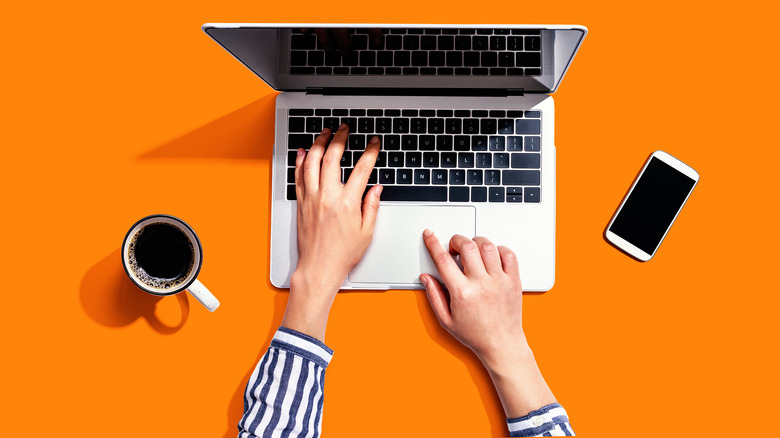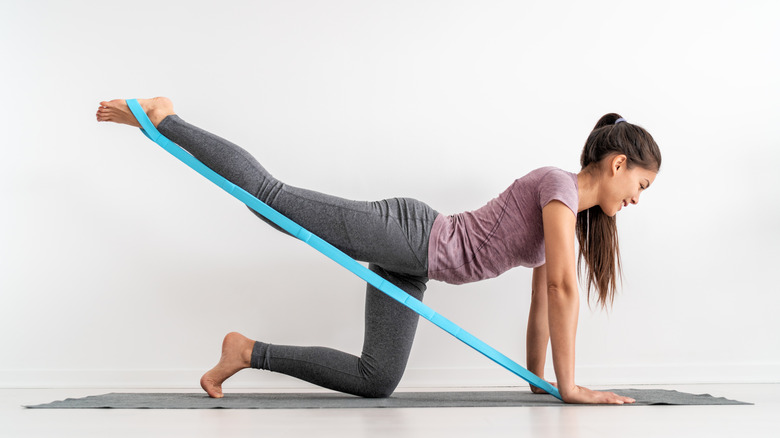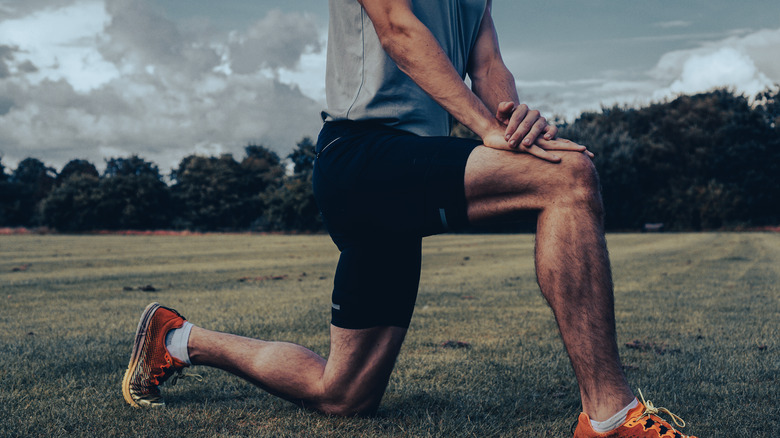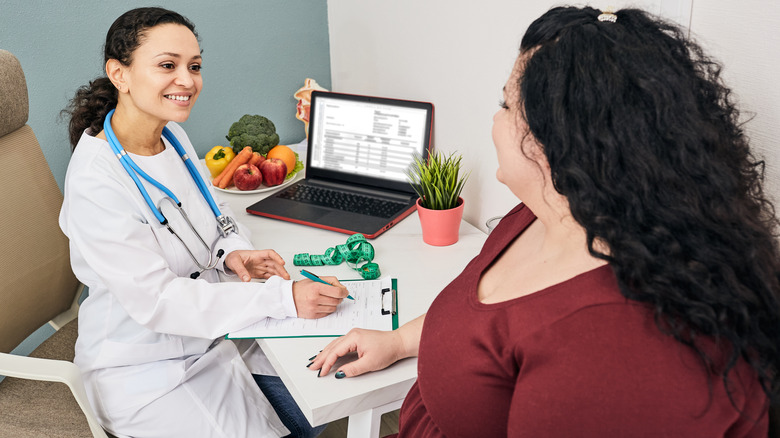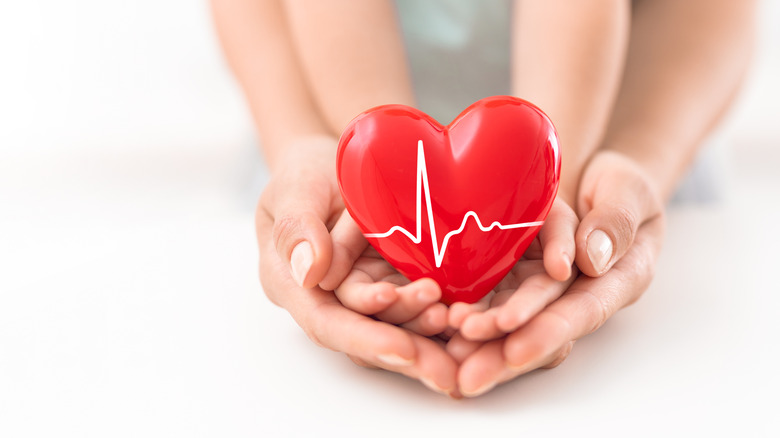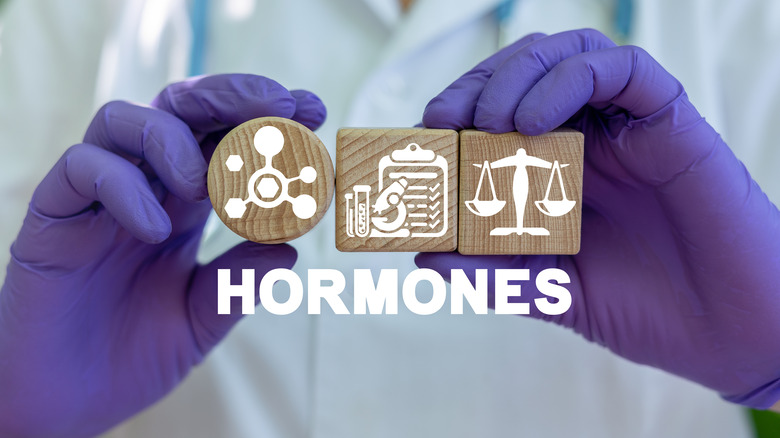Strange Ways Working A Desk Job Can Impact Your Health
While we have all probably known, at least peripherally, that working long days at a desk isn't the best for our health, the advent of #workfromhome amid the COVID-19 pandemic has brought this, uh, epidemic into the limelight. And as many of us are transitioning back to working from our offices, we are wondering if this is the best choice for our health. After all, might it be considered healthy to take your dog for a walk in the middle of the day after spending a few minutes decompressing while you eat your lunch from the comfort of your own dining space?
What about that feeling of being physically chilled and stiff with no motivation to work out after putting in an 8-hour day? That can't be healthy, can it? You're right, it isn't. But working at our desks day in and day out can affect our health in quite a few surprising ways. And most of these strange health effects are definitely not benefiting you (via Men's Health).
Your butt muscles will suffer
Sure, you spend plenty of time thinking about other people's butts, but how much thought do you give to your own? Moreover, how much thought have you put into keeping your butt muscles healthy to help support your posture? Unless you're an exercise nerd like we are, the way your butt muscles support your posture may have never crossed your mind. The thing is, your desk job might be effectively shutting down your gluteal prowess, so it is definitely something that is worth looking into.
Known in some circles as "dead butt" syndrome, your gluteus medius begins to atrophy as you sit for long periods of time (via Cleveland Clinic). Your gluteus medius is one of your three main butt muscles and is essentially in charge of providing some stability to your multidimensional pelvic girdle. When your gluteus medius loses strength, your ability to move, sit, and walk with ease is inhibited. Weakness in this area can even cause nerve pain, and since the effects are cumulative, it is really easy to overlook the onset of dead butt syndrome.
To combat gluteus medius weakness, you can incorporate specific glute-building exercises into your routine to maintain strength. Deep tissue massages can also help release a lot of the tension you are experiencing and encourage your muscle fibers to fire properly and provide the support and strength that they are supposed to.
You might irritate your hip flexors
Hip flexor irritation often occurs in tandem with dead butt syndrome (via Cleveland Clinic). Your hip flexors are located on the front side of your body and are responsible for bringing your knees toward your torso, also known as flexion of the hip joint. Since these muscles find full extension when we are standing, it is logical that constant sitting will cause these muscles to tighten and, in some cases, shorten. When our hip flexors become tight, shortened, or just lazy, we are likely to experience pain and imbalances (via Healthline).
To combat tight and irritated hip flexors, it is important to break up the monotony of sitting all day, every day. You can accomplish this by investing in a sit-to-stand desk, or ensure that you are getting up to stand and walk around every 40 minutes or so. By incorporating these practices, you will give your hip flexors more time in their extended position, which can help relieve some of the pain that can occur when they shorten and deactivate as a result of too much sitting (via Healthline). Making sure that your fitness routine includes a healthy dose of hip flexor stretching and glute strengthening can also help preserve your physical body without compromising your career.
Your eating habits might be affected
Weight gain is often called out as an unwanted side effect of a desk job, but it turns out that the weight you gain might not only be caused by sitting. In many cases, the habit changes that come about when you begin a desk job can be to blame, according to an article published by the New York Post. For instance, snacking while working, along with sheer anarchy when it comes to food and treats in some offices, can contribute to adding poundage. On average, Americans claim that they have gained about twelve pounds as a result of working at their office jobs. Nine out of every ten people polled say that they attribute their weight gain to their desk job.
Between happy hours with coworkers, job-related stress, and ordering takeout when you're too tired to meal plan or cook, your caloric intake can slowly creep up. When you combine these altered eating habits with so much sitting, along with decreased time and energy for exercise, you are likely to see a weight increase that you weren't expecting.
Weight gain can lead to life-altering diseases
Around the world, time spent at desk jobs isn't just causing people to gain weight: It's leading to obesity (via Reuters), which can in turn cause further health complications down the road. Being overweight or obese increases the risk of developing many diseases, as well as making it more difficult to carry out your activities of daily living, according to the Centers for Disease Control and Prevention (CDC). Some of the illnesses that mount as a result of obesity can truly change the way you live your life. For example, obesity has been linked to increased incidences of type 2 diabetes, strokes, cardiovascular disease, many cancers, and even has mental health implications. Aside from serious life-threatening conditions, obesity can inhibit the ease with which you are able to move your body and even lead to widespread pain. So it follows that one of the best ways to prevent many of these health problems is to maintain a healthy body weight. Of course, a healthy body weight combined with regular exercise and a healthy diet is the best way to go (via Atrium Health).
Your eyesight will suffer
Computers and technology in general are pretty amazing, right? They have changed the way we live, and in many ways they have changed things for the better. However, constantly staring into a computer screen can mess with the health of your eyes. We assume, in this day and age, that your desk job consists mostly of work on a computer, because who even uses paper anymore? According to Time, around 64% of office workers experience complications with vision due to the hours they spend in front of a computer screen.
Computer vision syndrome (CVS) is a real thing, and while it is not thought to cause permanent eye damage, it can lead to acute discomfort and unpleasant symptoms. These symptoms typically include strained vision, blurred vision, eye irritation and redness, and even neck and shoulder pain. Reconfiguring the angle of your monitor and ensuring that your vision is being cared for as well as it can be by a optometrist are two ways to start reducing the effects of CVS. You can also try out computer glasses, which are specifically designed to help mitigate the impact of staring at a screen.
You could sustain lung damage
Talking about lung damage is a whole different monkey when you compare it to some of the less frightening effects that your desk job might be having on your health. The United States Environmental Protection Agency (EPA) calls this phenomenon "Sick Building Syndrome." This phrase is used to reference occasions when workers are sickened as a result of chemicals and toxins they are exposed to when working in an office building. Even in a room that is being pumped full of super crisp-feeling air conditioning, you are putting your lungs at risk. Especially if the building isn't receiving the TLC is deserves, you are likely being exposed to gases, particles, molds, and bacteria that might be detrimental to your health (via Inc.).
Aside from the air that is being pumped throughout your building, printers and photocopiers can have harmful effects on your lung health as well. This becomes a bigger issue if the filters are not changed regularly. Even laser printers have been known to release particles that can infiltrate your systems and lead to lung issues and other health complications.
Your sleep patterns may be disrupted
While the stress of work might keep you up at night, studies have shown that simply working in an office or indoors all day can also play a role in how well or poorly you sleep. Sleep disturbances as a result of indoor work are most closely related to the amount of natural light you are exposed to. One 2014 study published in the Journal of Clinical Sleep Medicine found that workers who had more windows in their offices slept better and had fewer sleep disturbances than those who worked in an indoor environment without windows.
This study took into account the quality of the sleep the participant was getting, but also assessed overall wellbeing, activity during sleep, and sleeping and waking patterns. Overall, the study concluded that people who work at desk jobs with access to natural light fared far better than those who do not. They even found that workers who had more natural light exposure during the week were more inclined to be physically active, thus improving their overall health.
Your bad cholesterol may increase
Our bodies need cholesterol. The tricky part is understanding that there are two types of cholesterol, one that is healthy and necessary for optimal function, and one that in excess amounts can lead to arterial plaque and subsequent health complications (via Healthline). Too much time spent sitting on your butt can cause your levels of HDL, the good kind of cholesterol, to decrease. Bad cholesterol, also known as LDL, can lead to heart problems — and, unfortunately, sitting too much can lead to increased levels of bad cholesterol (via Science Daily).
Since your HDL helps fight off heart disease and your LDL can add to it, it makes sense that an imbalance of the two could increase your risk of heart disease. If you are required to work from your desk for long hours every day, there are a few steps (literally) that you can take in an effort to mitigate your risk of heart disease. Some researchers suggest that aiming to get in around 15,000 steps per day is a great place to start. While achieving this on a workday might sound tough, riding a bicycle to your office or taking an active lunch break can help to up your physical activity (via Mayo Clinic).
Your hormones may become irregular
We all know that overworking doesn't exactly feel great within our bodies. This can be especially true for people who work nightshifts or even just longer-than-average hours. But did you know that subjecting yourself to long hours can actually cause dis-regulation of your hormones? While it might seem like our bodies adapt to whatever we tell them to do, including eating and sleeping on nontraditional rhythms, these habits can subtly wreak havoc on our hormonal states.
A study published in the Proceedings of the National Academy of Sciences of the United States of America examined the effects on people who engaged in abnormal circadian rhythms, and the results were clear: The subjects who were not held to a standard circadian rhythm had higher levels of both glucose and insulin. Insulin is a hormone that helps our bodies maintain homeostatic levels of glucose within our blood. Both excess levels of insulin and high blood sugar have been linked to diseases such as diabetes, obesity, and cardiovascular complications (via The Clinical Biochemist Reviews).
By adhering to a standard circadian rhythm and not working at your desk until late into the night, your hormones will regulate more consistently and healthfully, and hopefully help you ward off unwanted hormone-related illnesses.
Boredom can affect your health
We'd probably all love to say that we have the most stimulating jobs out there, that we always give 100% effort at them, and that our evolved brains are impervious to boredom. However, this obviously is not true. If you're anything like us, the doldrums of boredom come creeping in every afternoon after we've lost focus on the task at hand but are expected to put in hours more. In fact, Forbes reports that an estimated 43% to 53% of workers are bored right now. They further report that this boredom can often be born of a simple lack of meaning in their work.
It turns out that this boredom can have a major impact on our health, especially on our mental health. Research has shown that boredom affects some people more significantly than others, both in how they react to the boredom and in the amount of time they spend bored (via Medical News Today). Those who report regular bouts of boredom and who react more negatively to it are more inclined toward mental health issues such as depression and anxiety. Many studies have confirmed a link between a shorter lifespan and depression, the exact same mood disorder than can be exacerbated by boredom (via WebMD).
Doing all of your work on a laptop can compromise your reproductive health
Your reproductive health is more likely to be compromised if you are working from home and, interestingly, more likely to be compromised if you are a male working from home. Tech Republic reports that laptop use is growing exponentially, with the number of PCs in use declining at a steady cadence. This is directly correlated to the increase in people working from home.
The reasoning behind the health consequence is fairly straightforward, though not something we've ever really thought about before: Using a laptop on your lap can degrade the quality of your sperm (via Journal of Biomedical Physics and Engineering). When a laptop is placed on the lap, it warms up the entire area beneath it, which has been known to negatively affect the health of sperm. The electronic circuitry and radiation emitted from laptops has also been known to affect sperm in the same, negative way.
To add insult to injury, working from home with a laptop on your lap can compromise the integrity of your posture, especially when used in this way repeatedly for long hours. Beyond these two major negative side effects, gazing into a blue light-emitting device, especially at night, can mess with your circadian rhythm and lead to other health complications.
Your keyboard may be harboring health-harming bacteria
We tend to think about public restrooms as being the main place that straight-up nasty germs are spread. Well, it turns out that other things we come into contact with on the daily might actually be teeming with more bacteria than even that public bathroom down by the beach that you avoid like the plague. Cell phones, naturally, are super gross (via Forbes). They typically house tons of fecal coliforms, which are bacteria that are present in the feces and GI tracts of warm-blooded animals, including humans (via Washington State Department of Health).
While maybe slightly less repulsive, your keyboard is definitely a breeding ground for bacteria, with 96% of keyboards tested in one study coming up positive for bacilli and staphylococci (per International Journal of Environmental Research and Public Health). According to Forbes, your keyboard may even have up to three times more bacteria than a public toilet seat. It sounds like we will be keeping out Lysol wipe habit alive long after COVID-19 fades into the distance....
Your memory may suffer
We obviously need our brains to help us carry out even the most mundane of tasks. Sometimes we have to use serious levels of cognition to get through our days, especially when our to do lists are seemingly endless. You may pride yourself on your ability to stay focused for hours on end, but, unfortunately, there is a tipping point when it comes to this brain power. Too much work and work-related stress can actually decrease our abilities to learn, remember things, and focus (via Science Daily).
While long-term stress has been known to impair memory function, even short-term stress can inhibit cellular communication within the brain. The good news is that even though stress can inhibit prime hippocampus function, the damage can be repaired. Studies have shown that once the stress stimulus is removed, the cellular connectivity throughout the brain can be restored. This means that once you relive yourself of the bulk of your work-related stress, you are likely to regain your ability to focus and retain information.
You may have mental health repercussions
Amid the chaos of work-related stress, an office building that lacks natural sunlight, and the pressure to work long hours, it should come as no surprise that many desk jobs come with a side of mental health complications (via Men's Health). While this is, of course, not always true, in many cases it is. Many offices are doing away with isolating cubicles because of the supposed mental health effects of working in a small, lonely little bubble. However, the open-concept/shared workspaces can also negatively influence your physical and mental wellbeing.
The forced social interactions and the sheer displeasure of working in a crowded and loud office space are only the tip of the iceberg. Working in an open-concept space can actually decrease the desire to have social interactions at work, which can also lead to feelings of isolation. Disorganization of shared office spaces can also contribute to decreased productivity and a sense of a cluttered mind for many people, and the pressure of trying to be constantly available — or being held on a "digital leash" — can increase the likelihood of burnout.
Your commute can be harming your health before you even get to the office
Your commute might be the worst part of your work life, depending on how often and how far you have to commute every day. As mentioned, too much sitting can lead to "dead butt syndrome," and sitting in the car for long periods of time can fully increase your chances of developing these muscular imbalances (via Cleveland Clinic).
Too much time in a seated position can increase your body mass index (BMI), increase your blood pressure, and lead to increased levels of blood triglycerides and bad cholesterol. And in case these negative effects are not frightening enough, the air pollution that you come into contact with as you commute, especially via automobile, can negatively affect the health of your lungs, heart, and other biological systems (via the Environmental Protection Agency). Cars emit a ton of nitrogen, particulate matter, and other toxins, according to Science Direct. If commuting is a non-negotiable part of your daily grind, Keck Medicine recommends driving with your windows up and your car fan on recirculate to decrease your exposure to toxins that might be circulating through the air on the freeway.

